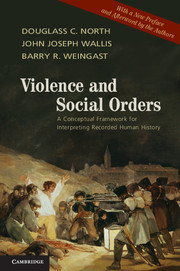Book contents
- Frontmatter
- Contents
- Preface
- Acknowledgments
- 1 The Conceptual Framework
- 2 The Natural State
- 3 The Natural State Applied: English Land Law
- 4 Open Access Orders
- 5 The Transition from Limited to Open Access Orders: The Doorstep Conditions
- 6 The Transition Proper
- 7 A New Research Agenda for the Social Sciences
- References
- Index
7 - A New Research Agenda for the Social Sciences
Published online by Cambridge University Press: 17 August 2009
- Frontmatter
- Contents
- Preface
- Acknowledgments
- 1 The Conceptual Framework
- 2 The Natural State
- 3 The Natural State Applied: English Land Law
- 4 Open Access Orders
- 5 The Transition from Limited to Open Access Orders: The Doorstep Conditions
- 6 The Transition Proper
- 7 A New Research Agenda for the Social Sciences
- References
- Index
Summary
The Framing Problems
We have built our framework on the rich literature in history, political science, economics, anthropology, and the social sciences. Our story is set in the context of the growth in the stock of human knowledge, which is the deep underlying source of the improving human material well-being. We have taken as given the changing patterns of technology, fertility, mortality, migration, and general demographics undergirding our account. Our focus has been on the changing structure of human interaction and its implications for the human condition.
A full account of human behavior would begin by asking how the mind deals with the process of change. A necessary preliminary is to understand how the brain interprets signals received by the senses and how the mind structures the result into coherent beliefs. Although some progress has been made in cognitive science, a pressing concern for future research is to understand the origin of conflicting belief systems, their flexibility, and their interaction with organizations and institutions. Many of the changes in the environment are novel, without precedent. The theories we have in the social sciences, however, are predicated on the notion of an ergodic, repeated, and predictable world in which the same problems recur and individuals can fashion solutions to them. How do we think about social processes when individuals, at best, have a limited understanding of what is happening to them as they continue to confront new experiences and novel situations that require an awareness of the dynamic nature of the process of change in which they are participants?
- Type
- Chapter
- Information
- Violence and Social OrdersA Conceptual Framework for Interpreting Recorded Human History, pp. 251 - 272Publisher: Cambridge University PressPrint publication year: 2009



